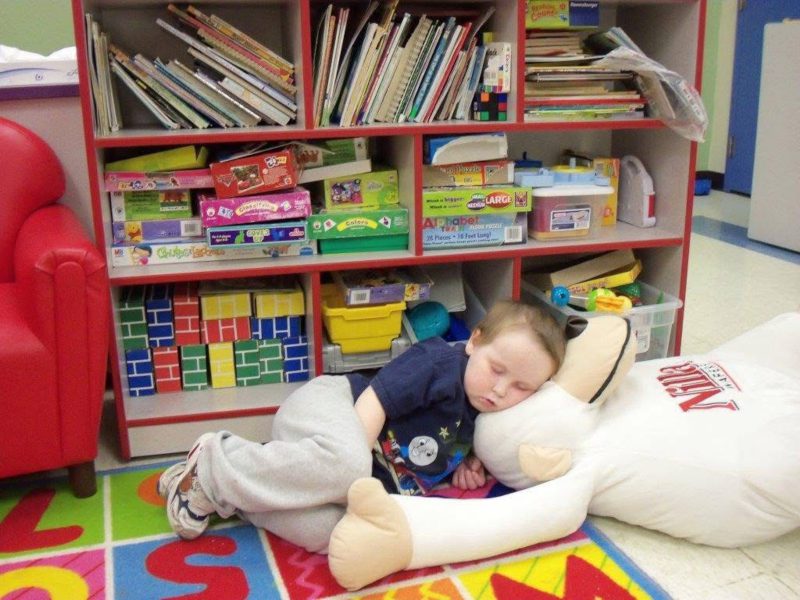Molly and Tim Hancock attribute the value of the Early Intervention Services at Partners in Child Development to the successful path their son, Declan, is taking. The foundation Early Intervention helped build for Declan, now 19 years old, has developed him into the person he is today.
Referral & Screening
Molly, the Coordinator of Youth Services at the Pollard Library in Lowell, was already familiar with Early Intervention Services. Clinicians from the service would come into the library for screenings and informational sessions. Based on her understanding of child development from her role as a children’s librarian and having family members on the spectrum, Molly recognized early signs of autism in Declan.
When Declan was between 18- and 20-months old, he began showing stereotypical signs of autism: He was toe-walking, made no eye contact and had words, then didn’t. “Declan would do these amazing almost conch-shell designs with Dum-Dums [lollipops], that were geometrically perfect,” Molly remembers.

Both Molly and Tim remember Early Intervention Services starting from the moment he was screened. Clinicians came to their house and began working with Declan even before an official diagnosis was made. In the beginning, services were provided in the home with floor time but soon led to music therapy and the Food Fun Group at the school.
Services & Community
In the beginning, Declan was a climber with little sense of personal safety and was seemingly unhappy. As Molly explains, “People with severe autism, especially when they’re very little, they present as angry because they’re scared. The world does not make sense to them, and we have no way to communicate in a way that they can understand.”
She remembers Declan cried often and exhibited self-injurious behavior. He needed a lot of help and support. While the Hancock’s were receiving Early Intervention Services, they learned techniques to open up his world a little bit with ways to communicate. He no longer had language, and the services helped to develop his receptive language. The structure and redirection skills Early Intervention Services provided helped Declan. The Hancock’s saw their son become happier with these learned skills.
“Early Intervention was wonderful and essential. Not just for Declan but for the whole family,” Tim remembers of the time. Any time extra services were offered, the family accepted them. They found Declan responding to the music within the group setting of music therapy. The occupational therapy sessions, especially ones working on toe walking, provided suggestions and assistance, giving both the family and Declan the tools for success.
The Food Fun group is an especially fond memory for Tim. The sessions took place at Early Intervention Services in a group setting focusing on how to integrate different foods and introduce new ones. Given the texture issues and food allergies Declan has, these ideas were vital for at-home techniques. As the Hancock’s discovered, children with autism don’t typically learn by modelling as they don’t connect with people. Rather, Applied Behavior Analysis therapy breaks down a task, into small steps. Declan learned how to master each step before adding a new step, doing this until the full task is mastered.
Attending these groups two to three times a week helped Declan with his foundational skills, continuing to grow and improve even to this day. And no less importantly, the sessions provided a space for parents to share their experiences, talking about how their child’s needs affected not only the child but everyone in the household. Tim remembers the additional support from other parents and growing a community with people who truly understand what their day-to-day look liked.
Foundational Start for Future Growth
Molly can’t say enough good things about the services they received but what resonated the most was how the staff really listened to her family. They offered helpful advice and suggestions, while never making the family feel “less than” if they didn’t know something. Most importantly, the staff made the family feel part of one team, all working towards the best for Declan, with constant communication and notes to refer to after every visit.
“Parents of special needs children, having the ability to be able to speak with people going through similar situations in addition to being able to see children going through similar situations… It was one of the best things we were afforded at that time. We knew we weren’t alone,” Tim says.
Molly succinctly reiterates Early Intervention Services taught her that, “Declan wasn’t broken, this is just how his brain worked.”
Declan is now in a residential program, living during the week with a roommate. He continues to learn life skills and how to become more independent. He is thriving in the program and loves the staff. Declan has grown into an easy-going, funny young man. A young man who likes to pretend with new staff that he needs helps with skills he’s already mastered, then grinning when they realize the joke. His go-to is shoe tying – gets them every time!
Molly and Tim Hancock are most grateful for the assistance they received during a time when they truly needed it. In retrospect, it helped prepare Molly, Tim, and Declan for the journey ahead of them and how to best advocate for Declan’s future needs and success.
Learn more about Early Intervention Services.
Read more blogs about Early Intervention Services.
Contact us.



